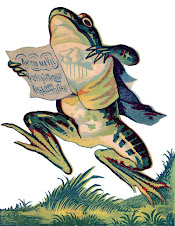
When you sit on the porch on the
Garner Rix Farm you see the hay field and the flower beds, the hillside covered in trees and swallows swooping back and forth searching for insects on a warm summer day.
There are no houses in sight.
Though this may see isolated, the cell phone tower across the way provides excellent service, the mailbox is at the end of the five and a satellite dish points to the sky from the back of the woodshed.
But what was it like for Garner Rix when he was first clearing the land? I had always imagined that communication was difficult to impossible but when I took a second look I found evidence to the contrary.
My first hint was when I was talking with my next door neighbor. We were discussing what life was like before the Interstate came through. You see, the mountains form a valley that makes sounds easily carry. My neighbor says that at one time you could be working out in the hay field and listen to voices down in the village. You might not be able to understand what they were saying but you could hear them.
Intrigued, I listened for breads in the traffic to see if that was still possible.
Once a year the Royalton Town Band plays down in the village. I had planned to go down but was running late when there was a break in the traffic and all of a sudden I heard the band playing. Then there was the sound of clapping.This tells me that Garner Rix too was able to hear his neighbors.
He must have been able to hear his neighbors chopping down trees, splitting wood, calling to their oxen or the women calling the men in to dinner.
Another day I began reading a wonderful book, Look to the Mountain, by LeGrand Canon. This is a book about a young couple,k Whit and Melissa, who got married and moved from Connecticut to New Hampshire in about 1767 or around 20 years before Garner Rix's family moved up to the Grants, later know as Vermont.
Whit and his neighbors often walked 20 miles or more to help eachother during the pioneering process. By working together they got to know eachother's ways while exchanging news from the neighbors or from distant places such as Boston or England.
One day Whit could hear someone cutting trees. He knew form the direction of the sound which place it came from. By paying attention to the rhythm of the chopping he determined which of the three men living on that homestead we doing the chopping, another form of communication.
There was a time when letters traveled quickly in this country. Around 1900 you could put a letter in the mail with a message that you would be up to visit in the afternoon. What amazed me when I read postcards from this time period was that these messages traveled so quickly that the people who you planned to visit received it in time to prepare before the visitor arrived.
The mail system is now reverting back to what it was like in Garner Rix's time. A first class letter now takes 7-10 business days. The difference is that now it costs much more. In Garner Rix's time, anyone who traveled expected to carry letters that were going in his general direction. They would be passed from person to person, left at houses or stores when the traveler took a different direction and be picked up by the next person headed in the right direction.
If the message was urgent, neighbors might make a special trip to get the message through. Many forms of communication have changed since Garner Rix's time. Compare and contrast the various form of communication. Which time would you prefer to live in?
To learn more about Garner Rix, be sure to check out
Garner Rix and the Royalton Raid.
This photo,
Looking Across the Field can also be seen on
RedGage
 My Side of the Mountain by Jean Craighead George
My Side of the Mountain by Jean Craighead George

